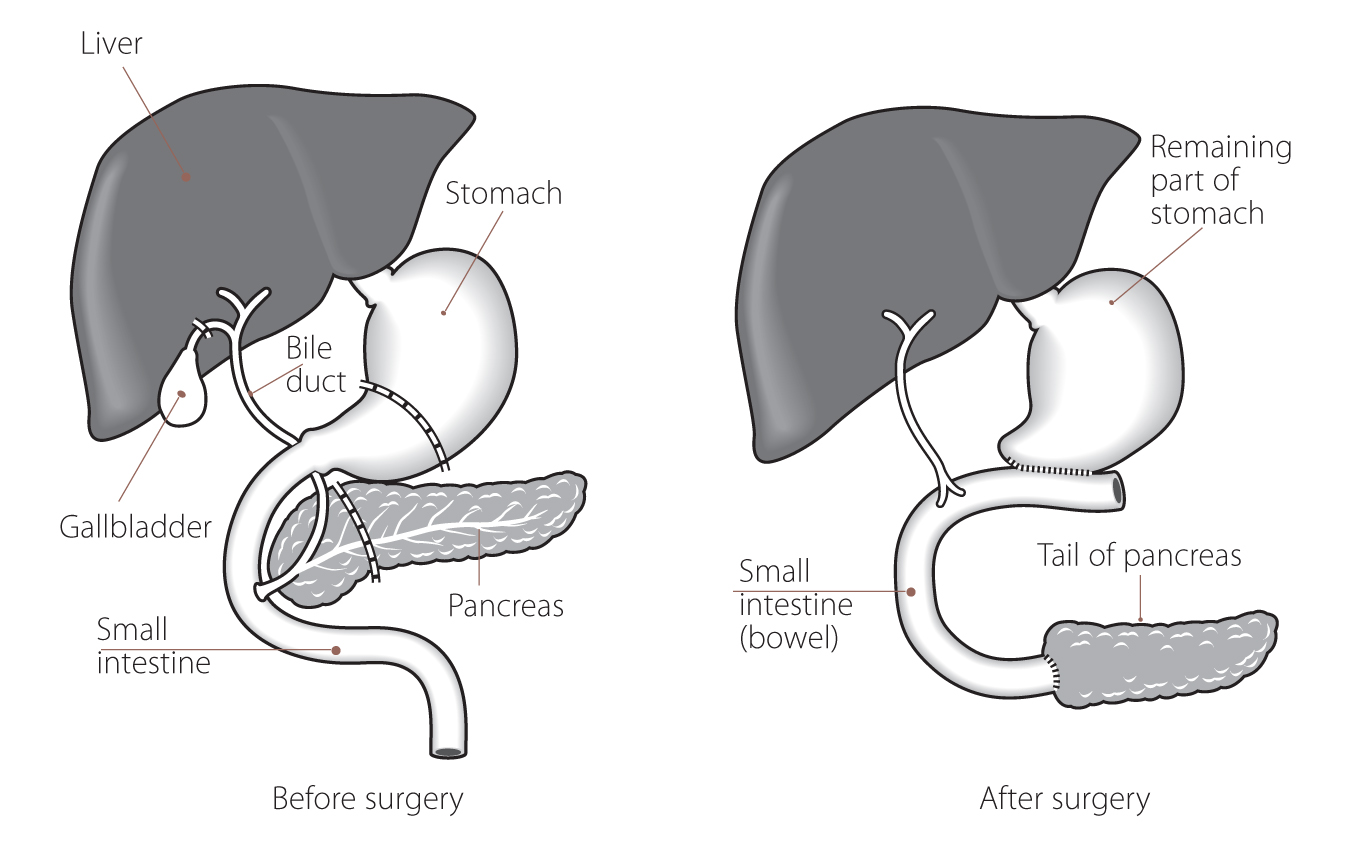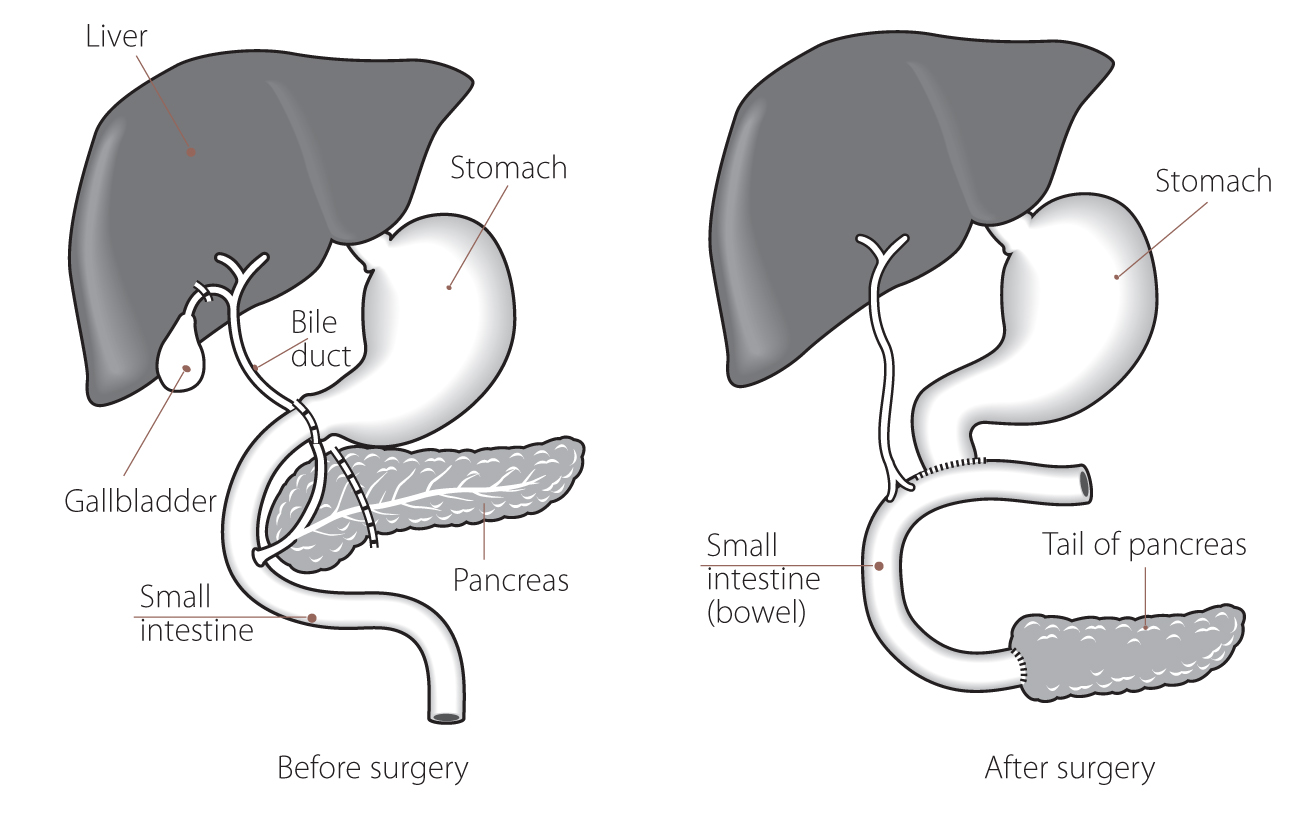Surgery for pancreatic cancer
Information about surgery for pancreatic cancer.
Types of surgery
Surgery offers the best chance of curing pancreatic cancer, but it’s only possible in a small number of cases. It may be offered if the cancer is found early and hasn’t spread to major blood vessels or other organs.
Your medical team will decide if surgery is right for you based on your cancer type, location, overall health, and scan results.
Types of surgery:
This type of surgery is done if the cancer is in the head of the pancreas, has not spread beyond the pancreas and does not involve major blood vessels. The surgeon will remove the head of the pancreas, the lower end of the stomach, part of your small bowel, some of the bile duct, your gallbladder and surrounding lymph nodes.
The remaining pancreas, bile duct and stomach are joined up to the small intestines. This allows the pancreatic enzymes, bile and stomach contents to flow into the small intestine for normal digestion.

This is similar to a Whipple procedure, except that none of the stomach is removed. Part of your pancreas, part of your small bowel (duodenum), some of the bile duct and your gallbladder are removed.

This is where all of your pancreas is removed as well as some of your small bowel, part of your stomach, your gallbladder, part of the bile duct, your spleen and nearby lymph nodes. This kind of surgery is uncommon.
This is done for cancer in the body and tail of the pancreas. The tail of the pancreas is removed as well as your spleen.
This is when the tail of the pancreas is removed but the spleen is left intact.
Pancreatic surgery is normally done in the National Surgical Centre for Pancreatic Cancer which is St. Vincent’s University Hospital in Dublin or in The Mercy University Hospital in Cork.
After surgery for pancreatic cancer
Pancreatic surgery is a big operation. You will either stay in an intensive care or high dependency unit (HDU) where the staff will keep you under close observation for a day or two, or you will go straight to the ward.
Read more about what happens after surgery.
Replacing insulin and pancreatic enzymes
If you have had part or all of your pancreas removed, you may develop diabetes and need to take insulin. Insulin is normally made by the pancreas. You may also need to take extra digestive enzymes, which are normally made by your pancreas. Both of these medications may be needed long term. If all your pancreas is taken away, will need both of these treatments. If you have the Whipple’s Procedure, you may need vitamin B12 every 3 months.
If you develop diabetes due to the surgery, you will need to make changes to your diet. Your dietitian and diabetic nurse specialist will give you more advice about this.
Your diet after pancreatic surgery
It may take a while for your stomach to get back to normal. Food may stay in your stomach longer or be ‘dumped’ into the small bowel quickly. Depending on your surgery, you may be advised to eat small meals regularly.
- Fatty diarrhoea, bloating, wind and failure to gain weight can be signs you’re not absorbing or digesting your food.
- With pancreatic cancer, you are likely to have some weight loss. You may need to eat a special high-calorie diet and take supplements.
- Talk to the hospital dietitian if you have any problems with eating or weight loss or if you have bowel problems after surgery.
We also have tips on coping with eating problems and weight loss.
Related links
Talk to a Cancer Nurse

Support Line
Our Daffodil Centres

